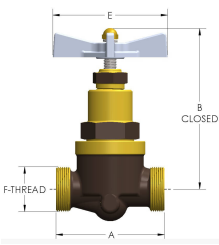A Pointed Solution for Precise, Regulated Gas Flow—the Needle Valve
Looking for an alternative to a shut off valve? An option that can supply you with some alternatives for more sensitive gas flow control? Companies can help minimize stress and strain on machinery and components by slowing gas flow in a regulated, orderly manner with a needle valve. This type of industrial valve is commonly used in gas filling, petrochemical and chemical processing applications.
Come explore the basics of needle valves including features and their applications in industrial gas and petrochemical processing.
What are needle valves?
Needle valves are a type of valve that is used to control the flow of fluid or gas in a system. It can be manufactured of stainless steel, brass or bronze. Its construction is comprised of a valve body, a stem and a small, tapered point called a needle or alternatively referred to as a plunger. They are known for precision and accuracy in flow control.

How does a needle valve operate?
The needle moves up and down via a knob or handle that is attached to the stem, similar to the action of a needle in a sewing machine. As the needle or plunger moves, it adjusts the size of a small orifice within the valve body. This in turn, regulates the flow of fluid or gas, as the opening within the orifice regulates or determines the amount of flow of fluid or gas.
This operation of a needle valve can be automated or adjusted by hand. In a manual operation, the handwheel controls the distance between the plunger and the valve’s seat. Turned in one direction, the plunger or needle lifts, opening the valve to allow fluid or gas to pass through. If turned in the other direction, the plunger decreases the opening in the orifice as it moves closer to the seat, to decrease the flow rate or close the valve.
An automated needle valve usually is connected to a hydraulic motor or air actuator. While larger manifolds might rely on automated valves, specialty gas filling operations often choose manual regulation to provide individual control for different gases. Needle valves from CPV Manufacturing for automated systems are pneumatically operated.
This style generally has low flow rates and a large pressure drop. This gives the operator the ability to throttle or better regulate gas flow.
Standard sizing for needle valves from CPV Manufacturing would range 1/8th inch tube size up to 2-inch pipe on the high end. In terms of pressure, there are two series of needle valves available. One is a 3,000-psi series while the other is a 6,000 psi series. Some select products of up to 7,500 psi also are available.
Desirable features for this type of valve
Needle valves have several features that make them a popular choice for industrial gas and petrochemical processing applications:
- Precise flow control – allowing users to adjust flow rates with great accuracy. This makes them ideal for applications with critical specifications for flow control rates, such as chemical processing or pharmaceutical manufacturing or aeronautics.
- High pressure capability – making them a popular valve in the oil and gas industry. Typical pressure ratings for needle valves can range from 3,000 up to 7,500 psi or more. Needle valves can be specified for high pressure gases including elusive gases like helium, hydrogen and oxygen.
- Temperature resistance – designed to withstand high temperatures, making them suitable for use in applications such as steam systems or petrochemical processing.
Some of the most common applications for needle valves, over a wide range of industrial gas and petrochemical processing applications can include:
- Aerospace
- Chemical processing
- Gas cylinder filling
- Petrochemical processing
- Pharmaceuticals
- Propane systems
Companies know they can rely on CPV Manufacturing for the highest quality engineered equipment. For more than a century, CPV has specialized in supplying valves that fit the high standards and specifications of organizations from the U.S. Navy to the aeronautics industry and gas processing operations of all types. Investigate our valve selection to find a needle valve or other type that suits your operations.

